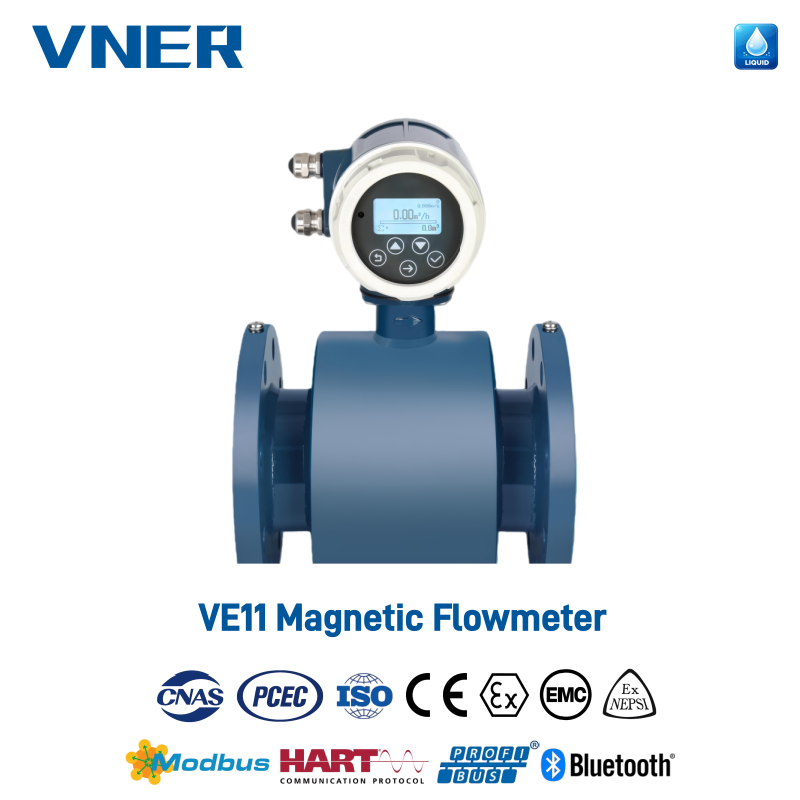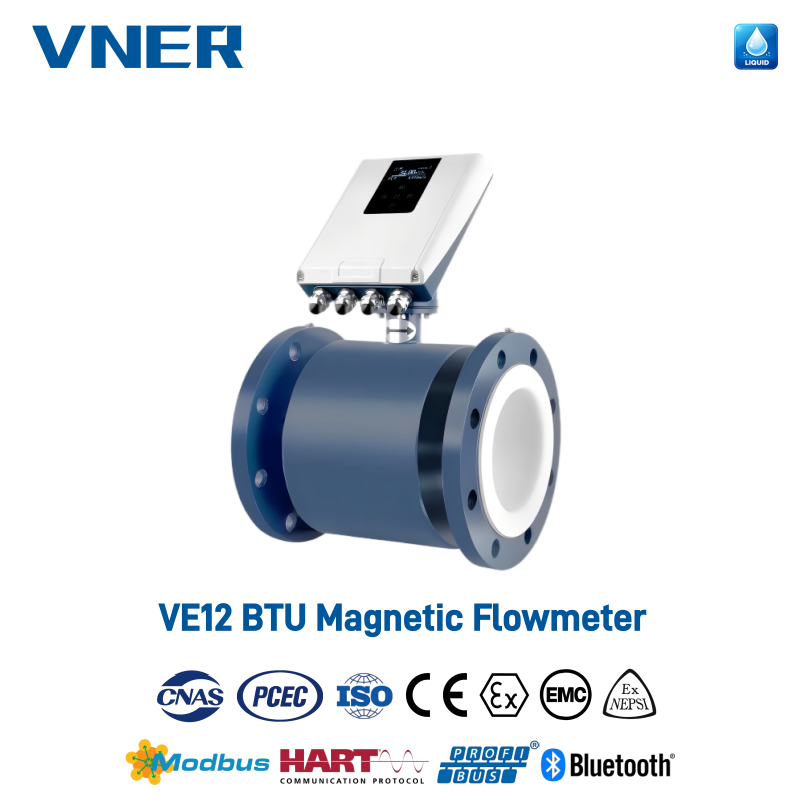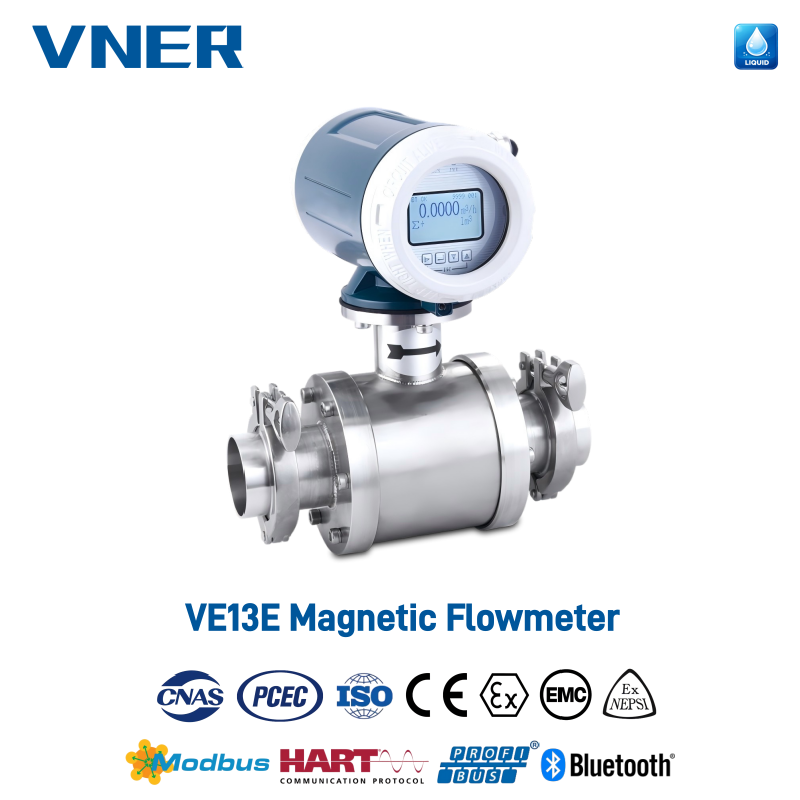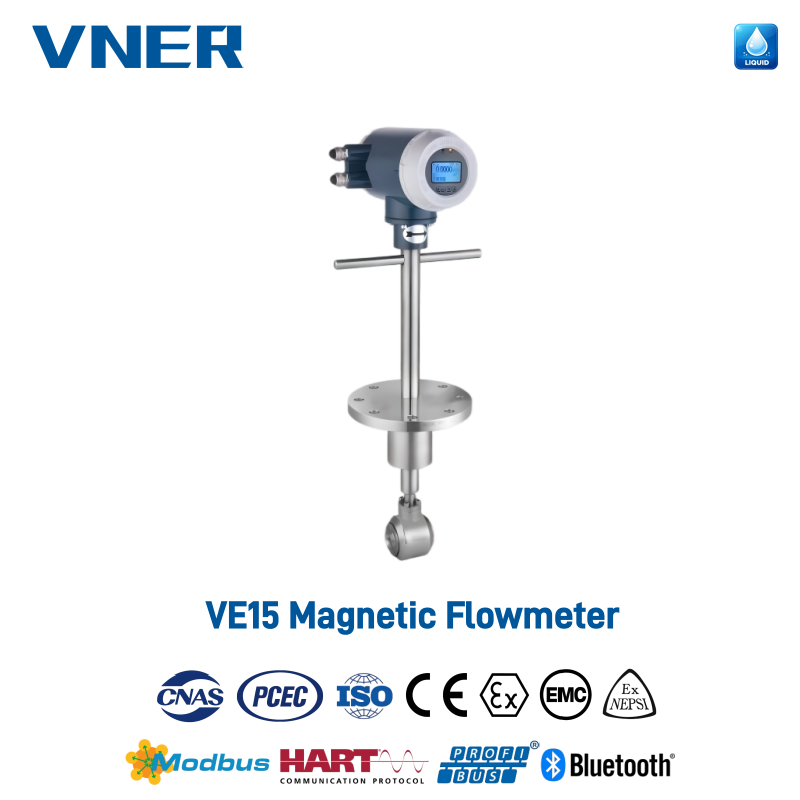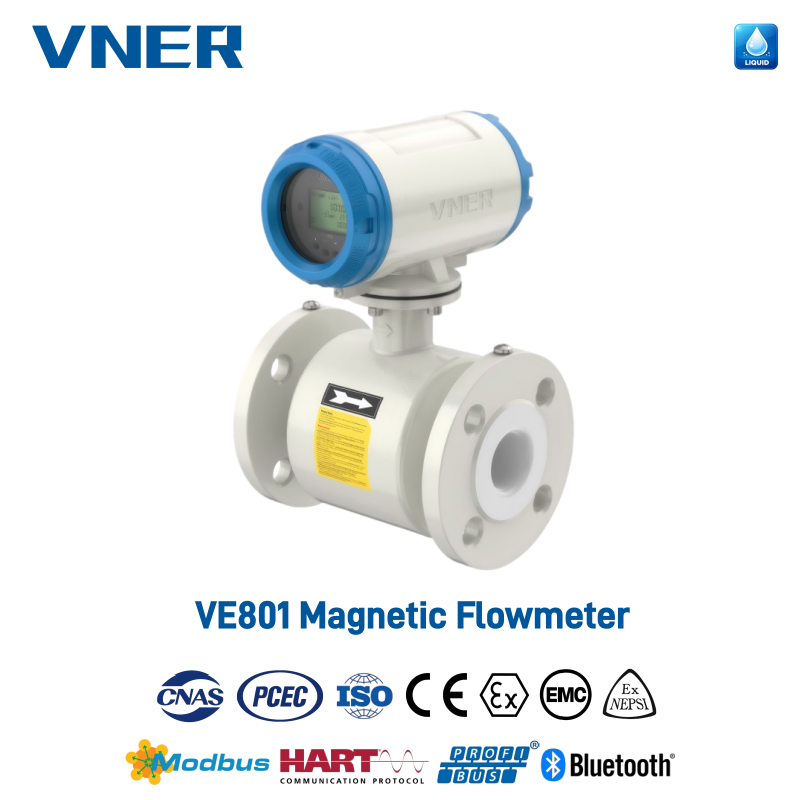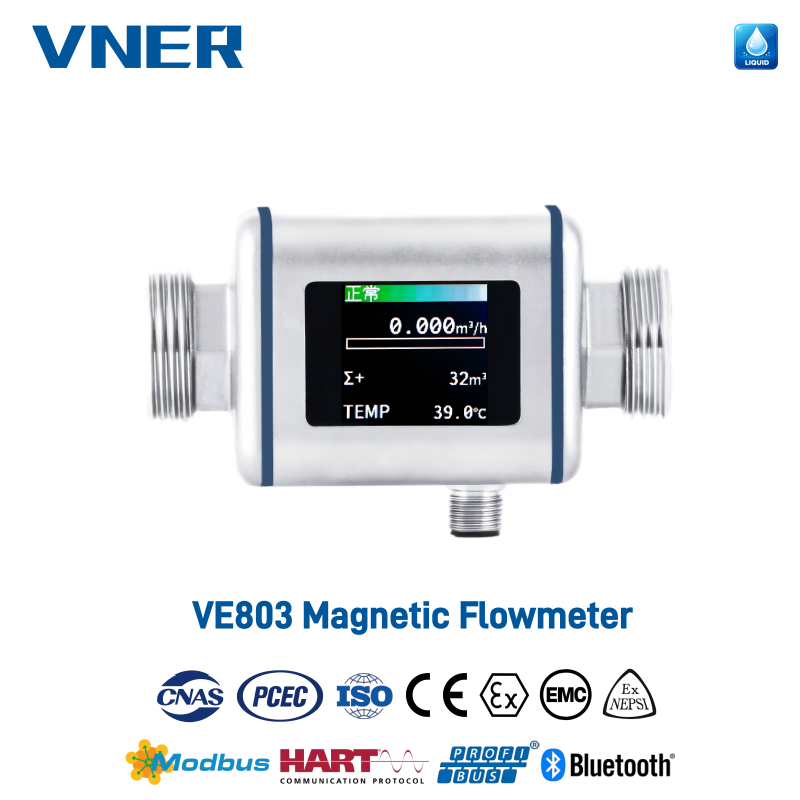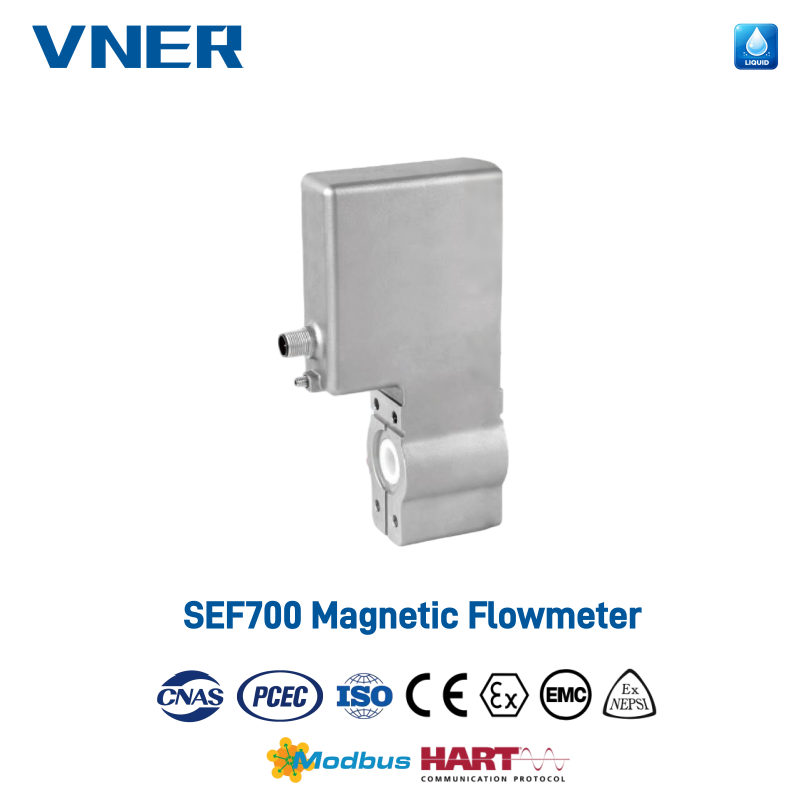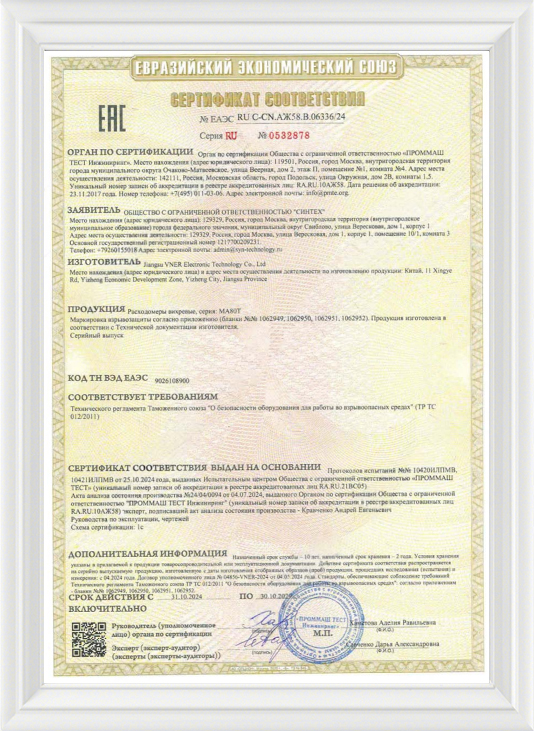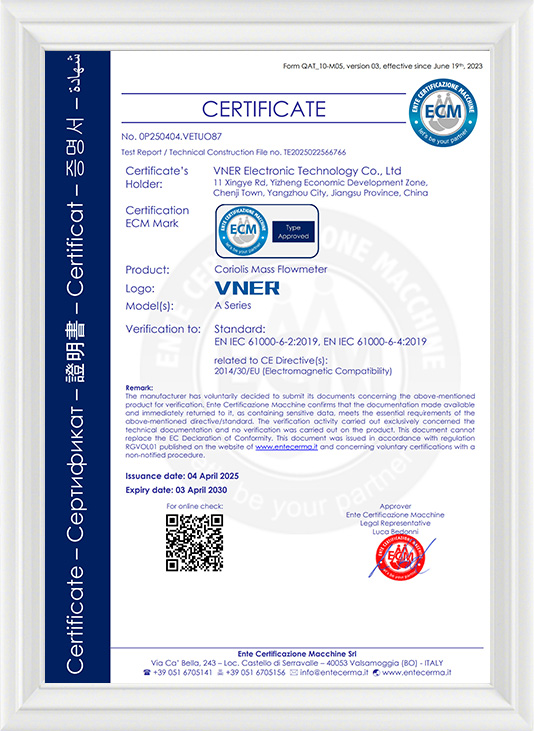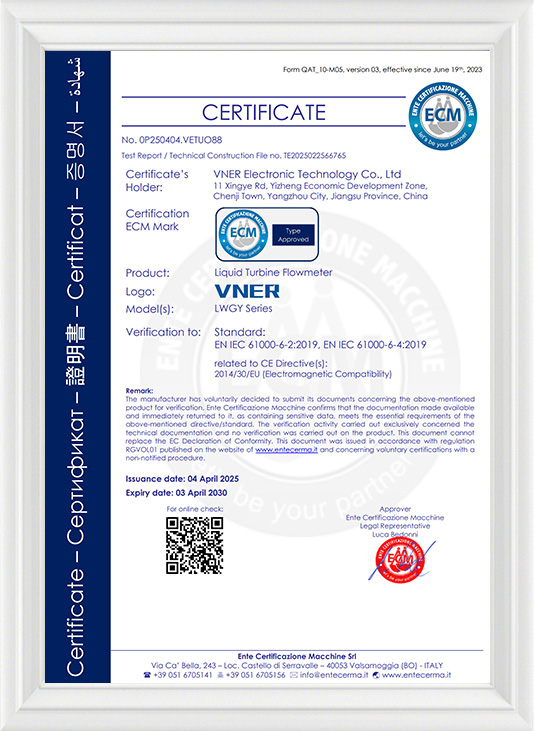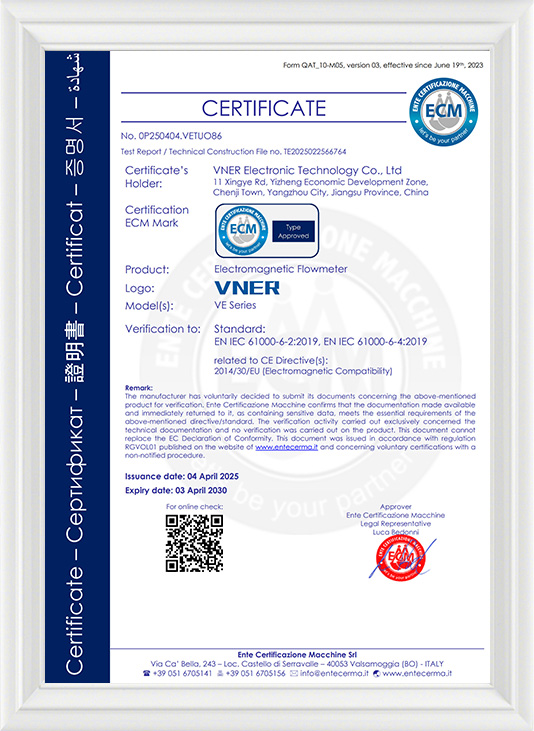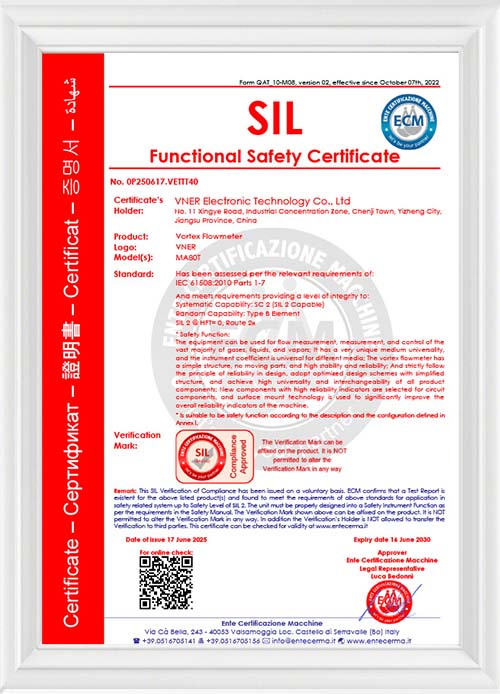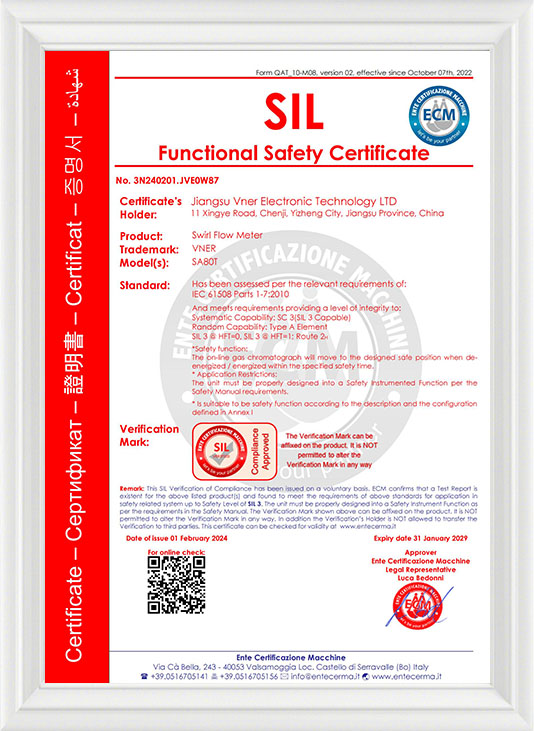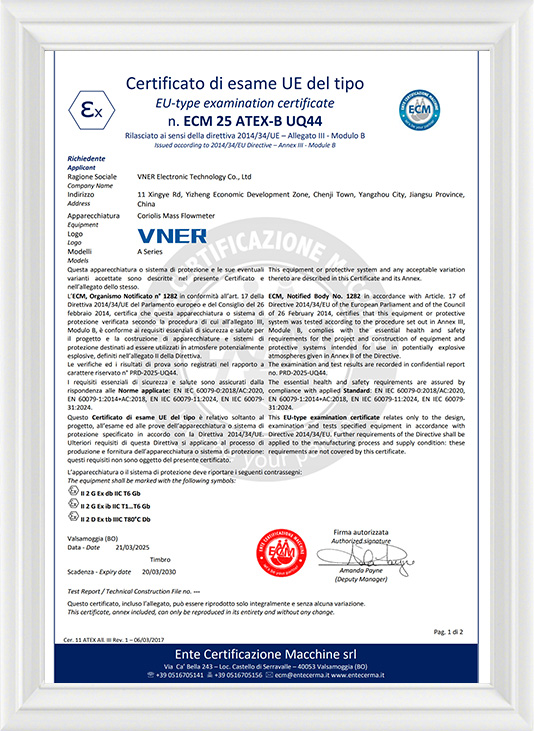If you need any help, please feel free to contact us
The electromagnetic flowmeter operates based on Faraday's Law of Induction, which states that an electromotive force(EMF) is induced in a conductor when it moves through a magnetic field. This measurement principle can be applied to conductive fluids. When such a fluid flows through a pipe perpendicular to the direction of a magnetic field, an induced EMF is generated in the fluid. This induced EMF can be measured using two symmetrically placed electrodes.
The signal voltage Ue is directly proportional to the magnetic flux density B, the distance between the electrodes D, and the average velocity of the fluid V. Since the magnetic flux density B and the distance between the electrodes D are constants, the signal voltage Ue is directly proportional to the average flow velocity V.
The equation used to calculate the volumetric flow rate indicates that the signal voltage Ue is linearly proportional to the volumetric flow rate.
The induced signal voltage is converted into scaled, analog, as well as digital output signals in the converter.
- No moving parts or obstructive components inside the pipeline, resulting in almost no additional pressure loss during measurement.
- Measurement results are almost independent of the fluid's pressure, temperature, density, and viscosity.
- Suitable for measuring the flow of various conductive liquids, such as water, wastewater, beverages, chemical raw materials, viscous liquids, pulp, mud, slurry, etc.
- Uses SMD components and SMT technology for high circuit reliability and low power consumption.
- Embedded microprocessor for fast computation and programmable low-frequency rectangular wave excitation, improving the stability of flow measurements.
- Nominal Size: DN (3-3000mm)
- Measured Medium: Conductive Liquids, Slurry and Abrasives
- Process Temperature: -20~±180°C
- Nominal Pressure: Standard Nominal Pressure:
<DN100- 4.0MPa
>DN100- 1.6MPa - Flow Measurement Accuracy: ±0.2%, ±0.3%, ±0.5%
- Repeatability:s 0.1%
- Output: (4~20)mA, HART, Modbus RS485, Pulse, Optional

As China VE Electromagnetic Flowmeter Manufacturers and VE Electromagnetic Flowmeter Suppliers, we are renowned for manufacturing professional and high-precision industrial instruments. Our expertise lies in providing unparalleled flow measurement resources, backed by over 12 years of experience solving complex applications.
Our precision flow metering devices are used by a diverse range of users, ranging from major oil and gas companies to photovoltaic providers, pharmaceutical manufacturers, and municipal services. We continuously contribute to the development of flow measurement in the domestic energy and chemical industries due to our expertise in measuring variable component gases and peculiar mediums.

-
In the realm of precision fluid measurement, the Liquid Turbine Flowmeter remains one of the most reliable and efficient instruments for handling clean, low-viscosity fluids. The L...
READ MORE -
Engineering Selection Guide for Chemical, Utility & Industrial Applications Accurate flow measurement plays a critical role across water treatment, chemical processing, utilit...
READ MORE -
In the specialized field of fluid dynamics, the Swirl Flowmeter stands out due to its unique "vortex precession" principle, offering high accuracy and a wide turndown ratio. The in...
READ MORE -
Chinese New Year Holiday Notice As the Chinese New Year approaches, VNER Electronic Technology LTD extends its sincere gratitude to our valued customers, partners, and colleague...
READ MORE
How does a VE electromagnetic flowmeter work?
A VE electromagnetic flowmeter operates based on Faraday's law of electromagnetic induction. It calculates flow rate by measuring the electromotive force (voltage) generated by a fluid flowing through a pipe. According to Faraday's law, when a conductive fluid flows in a magnetic field, an induced voltage is generated in the region where the fluid and the magnetic field interact. The magnitude of this voltage is proportional to the flow rate.
In a VE electromagnetic flowmeter, a sensor equipped with a magnet generates a uniform magnetic field on both sides of the pipe. When the conductive fluid flows through the pipe, the ions in the fluid move under the influence of the magnetic field, generating an induced voltage. This voltage signal is transmitted through electrodes to an external processing unit, where it is calculated based on information such as the fluid flow rate and pipe geometry to determine the flow rate.
The advantage of this flowmeter is that it is independent of fluid parameters such as viscosity, pressure, and temperature, thus providing highly accurate flow measurement. Furthermore, since electromagnetic flowmeters have no moving parts, they experience less wear and have a long service life. Compared to traditional mechanical flowmeters, electromagnetic flowmeters offer higher accuracy and reliability, making them particularly suitable for measuring large volumes of corrosive fluids, wastewater, and chemical liquids. Because it is independent of the fluid's physical properties, VE electromagnetic flowmeters are increasingly popular in industrial applications, particularly in the chemical, food, pharmaceutical, and power industries.
How is the VE electromagnetic flowmeter suitable for different fluids?
The suitability of a VE electromagnetic flowmeter primarily depends on the fluid's conductivity. According to Faraday's law of electromagnetic induction, only conductive fluids (such as water, acid and alkali solutions, and chemical liquids) can induce a voltage. Therefore, electromagnetic flowmeters are only suitable for conductive fluids and cannot be used for non-conductive fluids (such as oil and gas).
1. Water and Wastewater: Water is the most common fluid to be measured. Almost all types of water (including drinking water, wastewater, and sewage) have good conductivity. VE electromagnetic flowmeters are widely used in water treatment and supply systems.
2. Chemical Liquids and Solutions: Many chemical liquids (such as acids, alkalis, and salt solutions) are conductive, making them suitable for accurate measurement using electromagnetic flowmeters. Electromagnetic flowmeters are particularly suitable for measuring the flow of highly corrosive liquids. Their lining and electrode materials can be customized based on the liquid's characteristics, ensuring long-term stability and corrosion resistance.
3. Slurry and Pulp: Electromagnetic flowmeters are also suitable for liquids with particulate matter, such as slurry and pulp. These liquids often contain high concentrations of solid particles, but as long as the fluid itself is conductive, electromagnetic flowmeters can still provide accurate measurement results.
4. Food and Beverage: In the food and beverage industry, electromagnetic flowmeters are commonly used to measure the flow of liquids such as juice, milk, and beer. Because they do not contact the fluid, they avoid hygiene issues and ensure food safety.
Electromagnetic flowmeters are not effective for non-conductive fluids such as oil, pure water, or gas, as these fluids do not generate sufficient electromotive force for measurement via the electrodes. For these fluids, other types of flowmeters, such as turbine flowmeters or vortex flowmeters, may be more suitable.
Electromagnetic flowmeters also have certain requirements for the flow velocity of the fluid. Too low a flow velocity may result in too low an induced voltage, making accurate measurement impossible. Therefore, electromagnetic flowmeters are more suitable for measuring medium- to high-velocity fluids.
|
Fluid Type |
Applicability |
Remarks |
|
Water and Sewage |
Applicable |
Includes drinking water, wastewater, sewage, etc. Water has good conductivity, making electromagnetic flowmeters widely used in water treatment and supply systems. |
|
Chemical Liquids and Solutions |
Applicable |
Includes acid, alkaline, and salt solutions. Electromagnetic flowmeters are suitable for measuring corrosive liquids, with customizable electrode and lining materials. |
|
Slurry and Pulp |
Applicable |
Suitable for measuring slurries and pulp with particles. Electromagnetic flowmeters are not affected by solid particles and provide stable measurements. |
|
Food and Beverages |
Applicable |
Includes juices, milk, beer, etc. Electromagnetic flowmeters have no moving parts, avoiding hygiene issues, and are widely used in the food processing industry. |
|
Oils and Non-Conductive Fluids |
Not Applicable |
Electromagnetic flowmeters cannot measure non-conductive fluids, such as oil and gases. Other types of flowmeters, like turbine flowmeters, are required. |
|
Gases |
Not Applicable |
Electromagnetic flowmeters are not suitable for gas flow measurement, as gases do not have sufficient conductivity. |
|
High-Temperature, High-Pressure Fluids |
Applicable (requires appropriate material selection) |
Can be used with high-temperature, high-pressure fluids by selecting materials that are resistant to extreme conditions, ensuring accurate measurement. |
|
High-Concentration Corrosive Liquids |
Applicable |
Electromagnetic flowmeters can handle highly corrosive liquids by customizing electrode materials (e.g., titanium, Hastelloy) to meet the measurement requirements. |
What are the comparative advantages of the VE electromagnetic flowmeter over other types of flowmeters?
Jiangsu Vner Electronic Technology Co., Ltd., a company specializing in the manufacture of precision industrial instruments, has accumulated over 12 years of experience in the flowmeter field and has become an industry leader with its solutions for complex applications. The company is committed to providing high-precision flow measurement equipment, which is widely used in various industries such as oil, gas, photovoltaics, pharmaceuticals, and municipal administration. The company is particularly advantageous in measuring fluctuating gas compositions and special media.
Advantages:
1. No moving parts, low maintenance: The VE electromagnetic flowmeter, a key product of Vner, utilizes the Faraday principle of electromagnetic induction and requires no mechanical moving parts. Unlike traditional flowmeters such as vortex flowmeters and turbine flowmeters, the electromagnetic flowmeter's operating principle does not depend on the physical state or flow rate of the fluid, resulting in minimal wear and tear and virtually no maintenance. This feature is ideal for industrial applications requiring long-term stable operation, particularly in energy industries such as oil and gas, where long-term stability and reliability are key requirements.
2. High Precision and Wide Applicability: As one of Jiangsu Vner Electronic Technology Co., Ltd.'s core technologies, the VE electromagnetic flowmeter offers significant advantages in providing high-precision flow measurement. Electromagnetic flowmeters' measurement results are unaffected by fluctuations in fluid density, viscosity, temperature, or pressure, making them widely applicable across a wide range of complex industries. For example, Vner flowmeters are widely used in the oil and gas, pharmaceutical, and photovoltaic industries, where the physical properties of fluids are often complex and variable, requiring flowmeters with extremely high precision and stability.
3. Compatibility with Special Media: Leveraging years of industry experience, Jiangsu Vner Electronic Technology Co., Ltd. has accumulated extensive technical expertise in flow measurement for special media. For example, in the chemical, photovoltaic, food, and pharmaceutical industries, Vner electromagnetic flowmeters are capable of measuring fluids containing corrosive or particulate matter, which typically exhibit high losses or interference with traditional flowmeters such as turbine and vortex flowmeters. Electromagnetic flowmeters are unaffected by solid particles in the fluid and can accurately measure the flow of complex media such as slurry, wastewater, and acid and alkali solutions.
4. No physical contact required, ensuring hygiene and safety: Because electromagnetic flowmeters rely on electromagnetic induction rather than the operation of mechanical components, the electrodes do not come into direct contact with the fluid during measurement. This is crucial in industries such as pharmaceuticals and food processing. This feature effectively avoids cross-contamination and hygiene issues, making Vner electromagnetic flowmeters widely used for fluid monitoring, particularly in these highly regulated sectors.
5. Long-term stability and low maintenance costs: Compared to vortex and turbine flowmeters, electromagnetic flowmeters require no regular replacement of mechanical components. The low maintenance requirements and long-term stability of Vner electromagnetic flowmeters make them particularly suitable for complex applications in energy industries such as oil and gas. In these industries, long-term operational stability is crucial for reducing maintenance costs and improving production efficiency. Vner electromagnetic flowmeters are widely used in these fields due to their high reliability.
Limitations:
1. Limited Applicable Fluids: Because electromagnetic flowmeters rely on the fluid's electrical conductivity, they can only be used with conductive fluids. They cannot effectively measure non-conductive fluids such as oil and gas. Therefore, other types of flowmeters, such as turbine flowmeters or mass flowmeters, may be more suitable for non-conductive fluids like oil and natural gas. Jiangsu Vner Electronic Technology Co., Ltd., leveraging its extensive industry experience, has achieved significant success in measuring the flow of complex gases and fluctuating compositions, providing targeted solutions.
2. Installation Requirements: The installation of electromagnetic flowmeters requires certain requirements, particularly maintaining sufficient straight pipe length in the pipeline to ensure uniform and uninterrupted fluid flow. This is similar to vortex flowmeters, which also require a certain amount of straight pipe length. Applications with complex piping layouts may require additional installation costs and space adjustments.
3. Relatively High Cost: Although Vner electromagnetic flowmeters offer extremely high accuracy and reliability, their initial investment cost is higher than that of some traditional flowmeters. Small and medium-sized businesses with limited budgets may need to consider the cost-effectiveness of the flowmeter. However, as the equipment is used for a longer time, the electromagnetic flowmeter can actually reduce long-term operating costs due to its low maintenance and high stability, thus achieving a higher cost-effectiveness.
 English
English عربى
عربى Español
Español русский
русский Turkish
Turkish